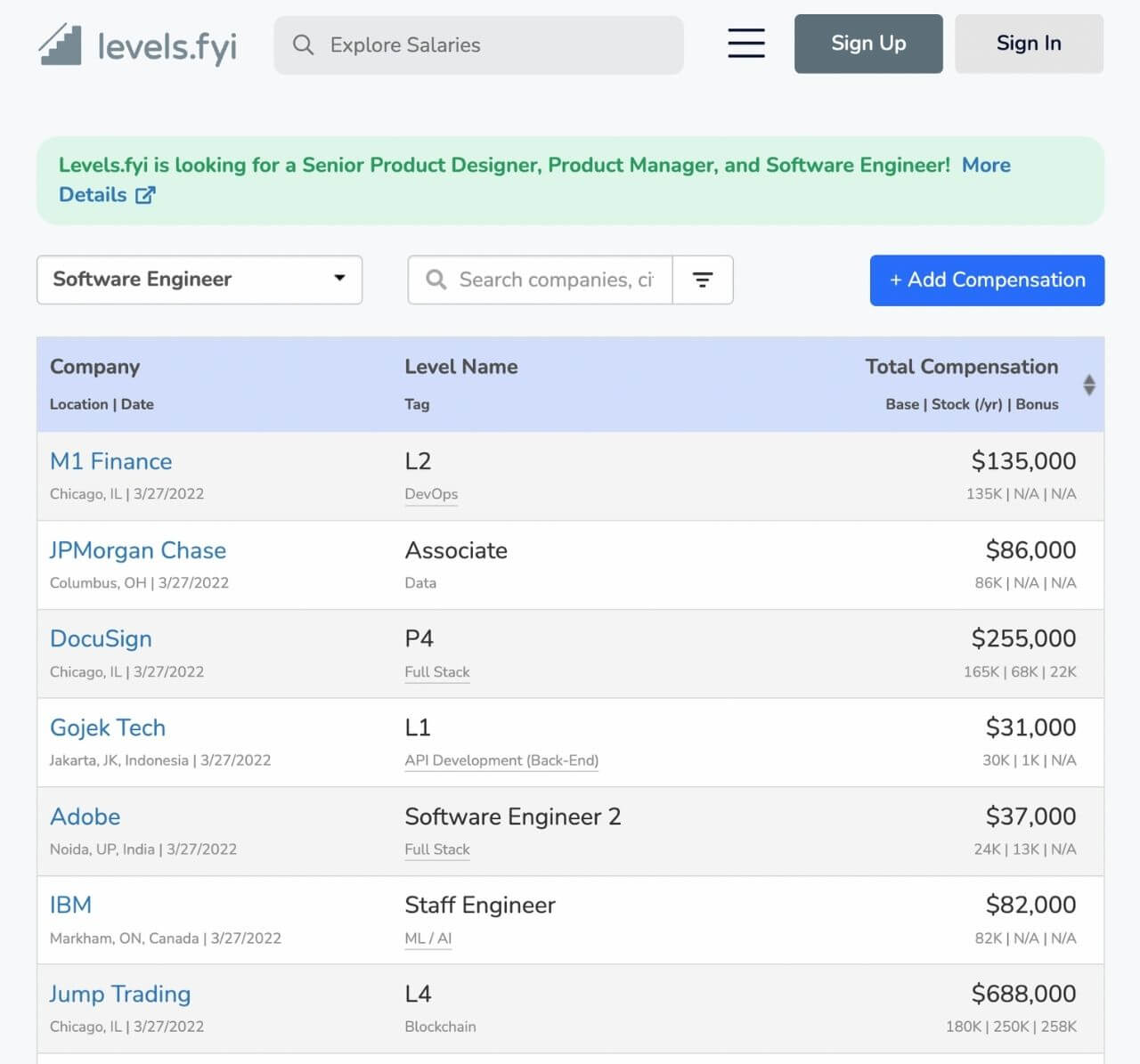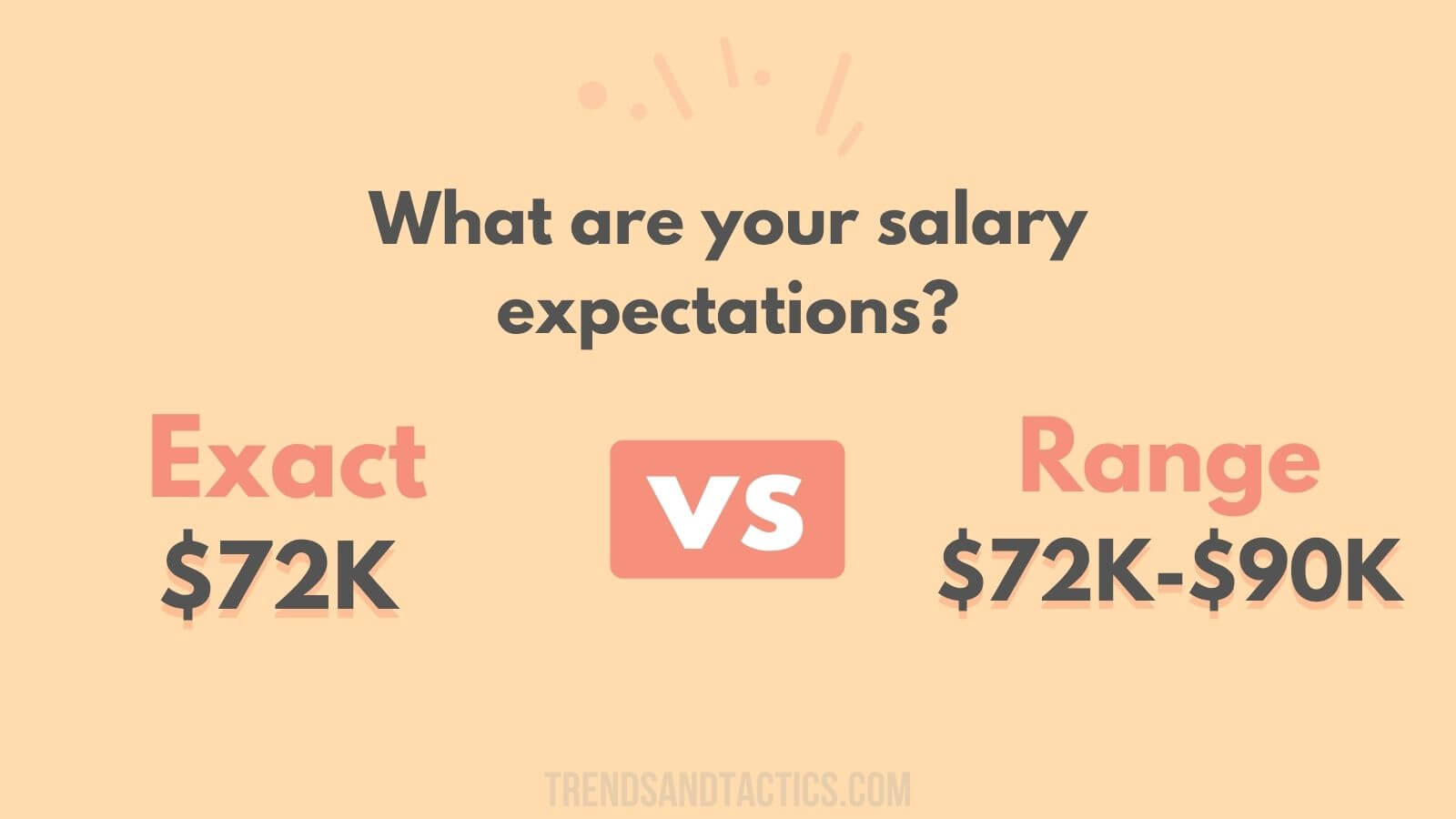Salary negotiation has the biggest impact on your earning potential than anything else, from a time investment perspective.
Why?
Because you can literally increase your earnings by thousands of dollars from a few hours of work.
Today, we’ll discuss how to negotiate salary with the 6 steps I used to negotiate an additional $11,000 in compensation after receiving my job offer.
1. Get Data on Current Compensation for Your Role
Learning how to negotiate job offers always starts with data.
Compensation data tells you how much the market is currently paying for your skillset, which increases negotiation power and insight into how fairly you’re being paid.
There are numerous salary sharing websites out there, but my favorite sites are levels.fyi and Glassdoor, although I’ve heard good things about Blind too.
Levels.fyi is perhaps the best resource for tech and business roles, while Glassdoor can be used for just about any role.

While base salary is the most common type of compensation, a compensation package can include a number of things, all of which have different levels of importance, based on your situation.
If you plan on working at a startup, it might be more difficult to find historical earnings figures.
Types of Compensation:
- Base salary – most common form of compensation, that’s paid biweekly over the course of a year.
- Sign on bonus – an amount paid upfront to entice candidates. Keep in mind, there’s usually a contingency that you’ll stay at the company for a certain amount of time, otherwise you have to pay it back.
- Performance bonus – usually paid at the end of the year, based on your performance/success in the role. These bonuses usually range from 3-20% of your base salary.
- 401k matching – many companies will match the investment into your 401k retirement savings account (usually 1-5%).
- RSUs – restricted stock units are stocks of the company granted to you, but not fully transferable or “vested” until certain criteria have been met (usually contingent on length of employment).
- PTO – paid time off is part of your compensation, because you’re being paid on days you don’t work. To some people, PTO can be more valuable than other types of compensation since it gives you more time off throughout the year and extra money.
- Other perks – employee discounts, child care assistance, gym membership, insurance, vacation days, expense account, etc.
Now that we covered the different types of compensation, and where to source this information, you’ll want to spend time studying the data.
The goal at this stage is to figure out the range of what people are being paid for the job you’re applying for based on your experience level, location, and individual company (if it’s a large corporation).
2. Answering the Salary “Expectation” Question from Recruiters
At this point in the process, I’m assuming you’ve started applying to jobs and will begin hearing back from recruiters shortly. Or maybe recruiters are reaching out to you via email or LinkedIn.
If you’re struggling to get on recruiter’s radar, these tips for finding a job might help.
In any event, it’s almost guaranteed you’ll be asked this question during the initial call with recruiters:
“What are your salary expectations?”
Now this seemingly innocent question can end up significantly hurting your earning potential if not answered in the right format.
Unfortunately most people don’t realize this and unknowingly hurt their earning potential, which is why a growing number of states are prohibiting similar questions about salary history.
Trend on the Rise:
21 states have banned questions about your earnings history to protect job seekers. Providing this information gives companies more leverage during the hiring process and often results in less pay for job seekers.
So, how do you answer this question?

You should always give recruiters a compensation range ($70k-$90k), rather than a single number ($72k).
This compensation range should be based on the data-driven research completed in Step 1. So, it should be based on your experience, location, and potentially the company itself (large companies have their own compensation hierarchies).
But even more importantly, the low end of your range should be an amount you’d be perfectly happy with if offered. For example, if you want to earn $75k at your next job, tell the recruiter your range is $75k-$95k.
It’s a great strategy, because a company will not move forward if they can’t at least offer the lowest end of your range, otherwise interviewing beyond that point wastes everyone’s time. So in essence you’re almost guaranteeing the offer (if received) hits your target amount.
Why give a compensation range?
- Increase chances of getting your target salary (or higher) – giving a range leaves the discussion more open ended, and helps you almost guarantee to get the lowest end of your range (which should be your target salary).
- Avoid wasting your time – some people say you should never give a number early in the interview process. However, this approach creates the risk of getting to the end of the interview process, and learning the company doesn’t have a large enough budget to hire you. Offering a range solves this problem, and doesn’t give away your negotiation power.
- Gives you room to negotiate – It’s possible the company is willing to pay even more than your target salary. By giving a range you make it easier for that situation to play out.
3. Take Detailed Notes During the Interview
After the first screening call, you’ll begin the core interview process.
Over the years, I’ve learned that interview processes can vary quite a bit. Some have more stages than others, some have a take home assignment, and some require on site interviews.
During my career, I’ve experienced interview processes with 7+ interview stages, which seems excessive, but that’s another topic.
Regardless of your specific interview process, you’ll want to take plenty of notes. It’s a good practice for multiple reasons, one of which is it helps you know how to ask for more money after the job offer.

Topics to Take Notes on in Interviews:
- Company benefits – your compensation package is not just salary. It includes things like health insurance coverage, retirement account matching, stock plans, daycare reimbursements, bonuses, work from home options, etc. To negotiate effectively, you need a full picture of your compensation package.
- Top skills the company is seeking – Every role will have a few skills or technologies that are high priorities. If you possess any of the high priority skills, then it can help you negotiate salary with a new job.
4. How to Respond to the Initial Offer
If you interviewed well throughout the process, it’s likely you’ll receive an offer. Oftentimes the offer will be made over the phone rather than email.
If you aren’t getting jobs offers, make sure you aren’t overlooking the biggest reasons people don’t get hired.
Our primary goal during the initial offer is to write down all the details (compensation package, start date, etc). If there are any gaps, now is the time to ask questions.
No matter how good the offer is, you should know there’s a 99% chance there’s room to negotiate salary after job offers.
After hearing the offer, we’ll want to ask for some time to process, because it’s a big decision. It’s important to stay upbeat and positive when asking for time to process so keep the conversation on a high note.
Here’s how I replied to the initial offer:
“[SALARY AMNT] is an interesting offer. I’m very excited about the position, and felt like I meshed well with the team.
You shared a lot of great information, so let me take some time to process this and get back to you because it’s an important decision. Would that work?”
If you’ve never done this before, it can feel scary to attempt, because you don’t want the offer to be revoked.
Trend on the Rise:
On average, it costs companies $4,000+ per new hire. When you consider the company has already invested thousands into you by the time they make an offer, it’s unlikely they’ll revoke the offer (i.e. throw away 4,000 dollars) for asking a question.
Plus, it’s important to remember that corporations go through hiring negotiations constantly.
In negotiations, it’s very rare to make your max offer out of the gate for two reasons: (A) they leave themselves no room to negotiate higher, and (B) people don’t want to pay more than they have to, so it’s natural to start below the max offer.
This strategy could be used when applying to jobs for former math teacher or jobs available with a history degree.
As long as you negotiate respectfully, a company who revokes a job offer is a company you wouldn’t want to work for anyway.
5. The Email Follow Up
At this point, most companies want a decision within 2-5 days. Some people try to get extensions, but eventually companies set a hard date for your decision.
Fortunately you shouldn’t need more than 2-5 days to negotiate, unless you have competing offers, which could double or triple the timeline.
Tactic for Success:
It’s easiest to negotiate salary when you have competing offers. Most people land competing offers by applying to a large number of jobs in a short period of time, which starts the hiring process timelines at the same time. This causes the offers to hit around the same time.
Give yourself a day or so to process the job offer, before following up with your recruiter via email.
Email is the preferred method to negotiate, because it’s easier to make your case, makes it easier for the recruiter to share your reasons with HR for approval, and it limits emotions over influencing the process.
Your goal with the email is to start the negotiation process, and make your case for why higher compensation is deserved. If you don’t build your case with convincing reasons, chances for success are low.
In my follow up email, I included the following:
- Thank company for making the offer, and why you’re excited about the role
- Ask to discuss the compensation package further
- Provide a few reasons why you feel higher compensation is deserved (examples: competing offer, strong experience in high priority skills for company, no 401k matching, limited health insurance, etc)
- Say how much you’re looking to make (can give a range again)
- End on a positive note
Here’s an example template:
Hi [Recruiter Name],
Thank you very much for offering me the position of [Position Name] at [Company]! It sounds like an amazing opportunity.
Before I can accept however, I would like to discuss the compensation package a little further. After learning in the offer that [Reason 1], which I was not aware of upfront.
In addition, [Reason 2], which I’ve learned is a key competency for this position.
For those two reasons, I’m looking for a base salary that falls in the range of [New Target Salary Range], a bit higher than the amount offered.
I can certainly see a future for myself at the company, and I’m confident that I can bring a lot of value. Thank you again for this opportunity.
Best,
6. The Close
After sending the follow up email, the recruiter scheduled another call with me.
They got approval from HR to increase the compensation package by $11,000.
I thanked them for the offer, and said I’d get back to them by the end of the day, at which time I ended up accepting.
In some cases they may follow up via email instead, but in any event it’s likely they’ll bump up your compensation in some way.
Wrapping Up
Learning how to negotiate salary can mean the difference of thousands to tens of thousand of dollars per year for you.
When you consider large corporations spend $4,000 per new hire and earn millions in profit per year, negotiating a higher compensation shouldn’t seem that far fetched.
I hope sharing my story was helpful. If you have any questions, feel free to reach out.
John-Paul Cody has been an avid online seller for years, across platforms including eBay, Mercari, Craigslist, and more. He has a Bachelor's Degree in Economics from UNC Chapel Hill, and works in data analytics and marketing.






